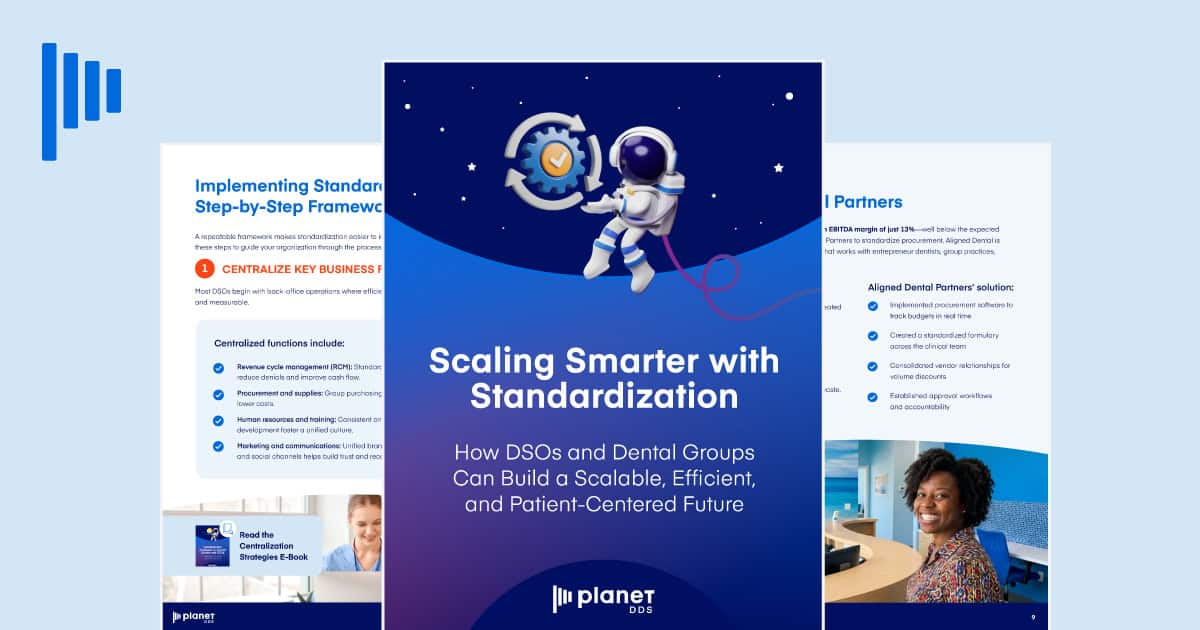Is Google Paid Search Right for Your Dental Practice?

If you’re looking for new ways to reach potential patients and grow your practice, you should explore investing in paid search. The paid search channel drives 15% of the average website’s traffic and is successfully used by many dentists.
To help you determine if paid search is for you, the article provides an overview of paid search, its benefits, and the criteria you should use to decide if it’s a worthwhile investment for your practice. We also share some best practices for getting started with paid search.
What is paid search for Dentists?
Paid search is a type of online marketing that matches a company’s paid advertisements with people searching for that company’s products or services. More practically, it’s the ads you can buy on Google. As a dentist running search ads, you determine the search terms you want to bid against, create the text ad, and launch your campaign. Paid search ads are typically paid for on a cost-per-click or cost-per-action basis.
How does paid search compare to other marketing channels in dentistry?
There are numerous marketing channels that you can use to attract more patients to your dental practice: direct traffic, organic search, paid search, email, website referrals, and social media (i.e. Facebook, Instagram, Pinterest, Snapchat). Each one behaves in a slightly different way and works better or worse for different businesses. Normally, a company has 1-2 channels that drive the majority of traffic to their website.
Compared to other channels, paid search:
- Has a faster time to impact – you can turn on a campaign and get traffic within a few hours
- Has a lower ROI – you can almost certainly get sales through paid search, but it’s hard to find highly profitable search terms with low bid prices.
- Is easier to turn on and turn off – there’s a single button in Google Ads that allows you to turn all of your campaigns on and off.
- Is easy to measure – since people who are searching have high purchase intent, they tend to click search ads, land on your website and purchase in the same online session.
Taken together, this means that paid search is an easy channel to test, but is unlikely to become highly profitable. You can still make a profit from paid search, just not as much as a free channel like SEO.
Types of paid search campaigns for Dentists
Over the years, Google has developed different types of paid search campaigns to give advertisers the most options, and to maximize the value of its search engine. The two most popular types of paid search advertisements are search ads and shopping ads.
Search Ads
Search ads are what most people think about when they hear “paid search.” These are the ads that Google places at the top and bottom of their search engine result pages (SERPs). For dental practices, search campaigns are the easiest to set up, and the most impactful.
Shopping Ads
Shopping campaigns are Google’s newest major campaign type. Shopping ads are the products that you see at the top of some Google searches. You can also see shopping ads by clicking the shopping link at the top of Google’s SERP. These campaigns can be used by dentists to promote their product line – say dentures, braces, retainers, etc.
What are the Benefits of Paid Search?
Paid search campaigns can drive traffic and new business to your dental website. In fact, paid search is the most predictably effective marketing channel. It’s a certainty that patients in need of your services are using Google to find their dentists. For dentists, paid search can be used to:
- Win new patients
- Book appointments with existing patients
- Bring attention to any major promotions that you run throughout the year
- Increase the awareness of your practice
How to Determine if Your Paid Search Campaign is Profitable
Paid search can help your practice grow. Unfortunately, paid search is also highly competitive. As a result, your paid search campaign might cost your business more than the profit it generates. Here’s a quick tutorial on how to measure the ROI of a paid search campaign. This assumes that acquiring new patients is the primary goal of your campaign.
Let’s make some simple assumptions:
- The average new patient comes to your practice for 5 cleanings that generate $150 in revenue each. That’s $750 in revenue.
- Your practice’s gross margin is 60%. So the $750 in revenue generates $450 in gross profit.
- You invest $2,000 into your paid search campaign.
- This campaign results in 200 clicks, and 5 new patients.
- These 5 patients are worth $2,250 in gross profit.
Based on these assumptions, your five new patients are worth $2,250 in gross profit. This is more than the $2,000 you invested in the campaign, so the campaign is profitable! In theory, you should keep running, and scaling, your paid search campaign as long as it is profitable.
Is Paid Search Right for Your Dental Practice?
As mentioned above, paid search is relatively easy to test and can be turned off at any point. However, learning how to use Google Ads and the related search tools takes several months. As a result, we recommend testing paid search with an outside agency or expert if you:
- Have a high-quality website that already converts visitors into customers
- Have enough budget to cover vendor costs plus $2,000 to spend on your campaigns
- Are comfortable with how to calculate the return-on-investment (ROI) of paid search campaigns
- Have a marketing agency that you really trust
Alternatively, you could invest 3-6 months learning how to manage your own paid search campaigns. It’s a fun skill to learn, but we doubt many dental professionals have enough time to dedicate to it.
Tips and Best Practices For Getting Started With Paid Search
If you decide to experiment with paid search, here are a few useful tips and best practices.
- Be wary of agencies or experts that overpromise and underdeliver. There are agencies out there that win new customers by guaranteeing positive outcomes, requiring large minimum budgets, and obfuscating campaign performance. When evaluating an agency, make sure that you feel comfortable with the team, talk to references, and understand how they will measure the ROI of your campaigns. If their ROI math doesn’t make sense, continue discussing it with them until it does. Fortunately, there are plenty of fantastic marketing agencies out there. A high-quality agency will cost about $200 per hour, and should spend 5-10 hours per month managing your campaigns. That means you can expect to pay $1,000 to $2,000 per month for your agency’s services.
- Start with a small experimental budget before scaling spend. Your first goal is to determine the viability of paid search – in other words, whether or not you can profitably drive business to your practice. To learn this for each campaign, you probably only need $1,000 to $2,000. If you spend your experimental budget and haven’t found a way to make your campaigns profitable, you might be better off investing your resources elsewhere.
- Learn marketing math. It’s okay to outsource the management of your campaigns, and for your agency to create your performance reports. However, you should still take the time to understand the marketing math involved in measuring campaign performance. If you don’t understand how to calculate ROI, and terms like impressions, clicks, conversions, bid strategy & cost per acquisition, you’ll be vulnerable to inaccurate performance reports.
- Test lots of different ad groups and bidding strategies. One daunting but valuable part of paid search is the number of different approaches you can experiment with. One one hand, this makes it hard to know the best place to start. On the other hand, it means there’s lots of opportunities to improve your campaign performance through experimentation. We recommend testing many different types of ad groups and bidding strategies to find the one that works best for your practice.

- Use geographical targeting. Google allows you to target your search ads to specific states, zip codes and cities. Using this feature is highly recommended for dental practices. It will prevent someone outside your community from seeing your ad, and ensures your budget is spent effectively.
Contact us for more information about how Denticon can streamline your systems that help you manage all aspects of your dental practice – including insurance.



